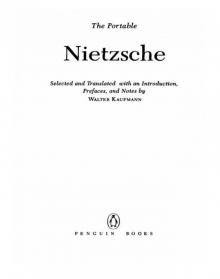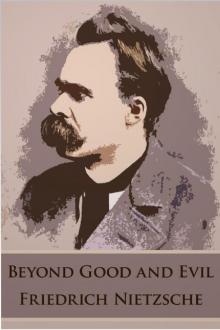- Home
- Friedrich Nietzsche
Aphorisms on Love and Hate Page 2
Aphorisms on Love and Hate Read online
Page 2
*
Morality as man’s dividing himself. A good author, who really cares about his subject, wishes that someone would come and destroy him by representing the same subject more clearly and by answering every last question contained in it. The girl in love wishes that she might prove the devoted faithfulness of her love through her lover’s faithlessness. The soldier wishes that he might fall on the battlefield for his victorious fatherland, for in the victory of his fatherland his greatest desire is also victorious. The mother gives the child what she takes from herself: sleep, the best food, in some instances even her health, her wealth.
Are all these really selfless states, however? Are these acts of morality miracles because they are, to use Schopenhauer’s phrase, ‘impossible and yet real’? Isn’t it clear that, in all these cases, man is loving something of himself, a thought, a longing, an offspring, more than something else of himself; that he is thus dividing up his being and sacrificing one part for the other? Is it something essentially different when a pigheaded man says, ‘I would rather be shot at once than move an inch to get out of that man’s way’?
The inclination towards something (a wish, a drive, a longing) is present in all the above-mentioned cases; to yield to it, with all its consequences, is in any case not ‘selfless’. In morality, man treats himself not as an ‘individuum’, but as a ‘dividuum’.
*
What one can promise. One can promise actions, but not feelings, for the latter are involuntary. He who promises to love forever or hate forever or be forever faithful to someone is promising something that is not in his power. He can, however, promise those actions that are usually the consequence of love, hatred, or faithfulness, but that can also spring from other motives: for there are several paths and motives to an action. A promise to love someone forever, then, means, ‘As long as I love you I will render unto you the actions of love; if I no longer love you, you will continue to receive the same actions from me, if for other motives.’ Thus the illusion remains in the minds of one’s fellow men that the love is unchanged and still the same.
One is promising that the semblance of love will endure, then, when without self-deception one vows everlasting love.
*
Intellect and morality. One must have a good memory to be able to keep the promises one has given. One must have strong powers of imagination to be able to have pity. So closely is morality bound to the quality of the intellect.
*
Desire to avenge and vengeance. To have thoughts of revenge and execute them means to be struck with a violent – but temporary – fever. But to have thoughts of revenge without the strength or courage to execute them means to endure a chronic suffering, a poisoning of body and soul. A morality that notes only the intentions assesses both cases equally; usually the first case is assessed as worse (because of the evil consequences that the act of revenge may produce). Both evaluations are short-sighted.
*
The ability to wait. Being able to wait is so hard that the greatest poets did not disdain to make the inability to wait the theme of their poetry. Thus Shakespeare in his Othello, Sophocles in his Ajax, who, as the oracle suggests, might not have thought his suicide necessary, if only he had been able to let his feeling cool for one day more. He probably would have outfoxed the terrible promptings of his wounded vanity and said to himself: ‘Who, in my situation, has never once taken a sheep for a warrior? Is that so monstrous? On the contrary, it is something universally human.’ Ajax might have consoled himself thus.
Passion will not wait. The tragedy in the lives of great men often lies not in their conflict with the times and the baseness of their fellow men, but rather in their inability to postpone their work for a year or two. They cannot wait.
In every duel, the advising friends have to determine whether the parties involved might be able to wait a while longer. If they cannot, then a duel is reasonable, since each of the parties says to himself: ‘Either I continue to live, and the other must die at once, or vice versa.’ In that case, to wait would be to continue suffering the horrible torture of offended honor in the presence of the offender. And this can be more suffering than life is worth.
*
Reveling in revenge. Crude men who feel themselves insulted tend to assess the degree of insult as high as possible, and talk about the offense in greatly exaggerated language, only so they can revel to their heart’s content in the aroused feelings of hatred and revenge.
*
Those who flare up. We must beware of the man who flares up at us as of someone who has once made an attempt upon our life. For that we are still alive is due to his lacking the power to kill. If looks could kill, we would long ago have been done for. It is an act of primitive culture to bring someone to silence by making physical savageness visible, by inciting fear.
In the same way, the cold glance which elegant people use with their servants is a vestige from those castelike distinctions between man and man, an act of primitive antiquity. Women, the guardians of that which is old, have also been more faithful in preserving this cultural remnant.
*
Love and justice. Why do we overestimate love to the disadvantage of justice, saying the nicest things about it, as if it were a far higher essence than justice? Isn’t love obviously more foolish? Of course, but for just that reason so much more pleasant for everyone. Love is foolish, and possesses a rich horn of plenty; from it she dispenses her gifts to everyone, even if he does not deserve them, indeed, even if he does not thank her for them. She is as nonpartisan as rain, which (according to the Bible and to experience) rains not only upon the unjust, but sometimes soaks the just man to the skin, too.
*
Degree of moral inflammability unknown. Whether or not our passions reach the point of red heat and guide our whole life depends on whether or not we have been exposed to certain shocking sights or impressions – for example a father falsely executed, killed or tortured; an unfaithful wife; a cruel ambush by an enemy. No one knows how far circumstances, pity, or indignation may drive him; he does not know the degree of his inflammability. Miserable, mean conditions make one miserable; it is usually not the quality of the experiences but rather the quantity that determines the lower and the higher man, in good and in evil.
*
The honor of the person applied to the cause. We universally honor acts of love and sacrifice for the sake of one’s neighbor, wherever we find them. In this way we heighten the value of the things loved in that way, or for which sacrifices are made, even though they are in themselves perhaps not worth much. A valiant army convinces us about the cause for which it is fighting.
*
Misunderstanding between the sufferer and the perpetrator. When a rich man takes a possession from a poor man (for example, when a prince robs a plebeian of his sweetheart), the poor man misunderstands. He thinks that the rich man must be a villain to take from him the little he has. But the rich man does not feel the value of a particular possession so deeply because he is accustomed to having many. So he cannot put himself in the place of the poor man, and he is by no means doing as great an injustice as the poor man believes. Each has a false idea of the other. The injustice of the mighty, which enrages us most in history, is by no means as great as it appears. Simply the inherited feeling of being a higher being, with higher pretensions, makes one rather cold, and leaves the conscience at peace. Indeed, none of us feels anything like injustice when there is a great difference between ourselves and some other being, and we kill a gnat, for example, without any twinge of conscience. So it is no sign of wickedness in Xerxes (whom even all the Greeks portray as exceptionally noble) when he takes a son from his father and has him cut to pieces, because the father had expressed an anxious and doubtful distrust of their entire campaign. In this case the individual man is eliminated like an unpleasant insect; he stands too low to be allowed to keep on arousing bothersome feelings in a world ruler. Indeed, no cruel man is cruel to the extent that the mistr
eated man believes. The idea of pain is not the same as the suffering of it. It is the same with an unjust judge, with a journalist who misleads public opinion by little dishonesties. In each of these cases, cause and effect are experienced in quite different categories of thought and feeling; nevertheless, it is automatically assumed that the perpetrator and sufferer think and feel the same, and the guilt of the one is therefore measured by the pain of the other.
*
Malice is rare. Most men are much too concerned with themselves to be malicious.
*
Limit of human love. Any man who has once declared the other man to be a fool, a bad fellow, is annoyed when that man ends by showing that he is not.
*
Mores and morality. To be moral, correct, ethical means to obey an age-old law or tradition. Whether one submits to it gladly or with difficulty makes no difference; enough that one submits. We call ‘good’ the man who does the moral thing as if by nature, after a long history of inheritance – that is, easily, and gladly, whatever it is (he will, for example, practice revenge when that is considered moral, as in the older Greek culture). He is called good because he is good ‘for’ something. But because, as mores changed, goodwill, pity, and the like were always felt to be ‘good for’ something, useful, it is primarily the man of goodwill, the helpful man, who is called ‘good’. To be evil is to be ‘not moral’ (immoral), to practice bad habits, go against tradition, however reasonable or stupid it may be. To harm one’s fellow, however, has been felt primarily as injurious in all moral codes of different times, so that when we hear the word ‘bad’ now, we think particularly of voluntary injury to one’s fellow. When men determine between moral and immoral, good and evil, the basic opposition is not ‘egoism’ and ‘selflessness’, but rather adherence to a tradition or law, and release from it. The origin of the tradition makes no difference, at least concerning good and evil, or an immanent categorical imperative; but is rather above all for the purpose of maintaining a community, a people. Every superstitious custom, originating in a coincidence that is interpreted falsely, forces a tradition that it is moral to follow. To release oneself from it is dangerous, even more injurious for the community than for the individual (because the divinity punishes the whole community for sacrilege and violation of its rights, and the individual only as a part of that community). Now, each tradition grows more venerable the farther its origin lies in the past, the more it is forgotten; the respect paid to the tradition accumulates from generation to generation; finally the origin becomes sacred and awakens awe; and thus the morality of piety is in any case much older than that morality which requires selfless acts.
*
Pleasure in custom. An important type of pleasure, and thus an important source of morality, grows out of habit. One does habitual things more easily, skillfully, gladly; one feels a pleasure at them, knowing from experience that the habit has stood the test and is useful. A morality one can live with has been proved salutary, effective, in contrast to all the as yet unproven new experiments. Accordingly, custom is the union of the pleasant and the useful; in addition, it requires no thought. As soon as man can exercise force, he exercises it to introduce and enforce his mores, for to him they represent proven wisdom. Likewise, a community will force each individual in it to the same mores. Here is the error: because one feels good with one custom, or at least because he lives his life by means of it, this custom is necessary, for he holds it to be the only possibility by which one can feel good; the enjoyment of life seems to grow out of it alone. This idea of habit as a condition of existence is carried right into the smallest details of custom: since lower peoples and cultures have only very slight insight into the real causality, they make sure, with superstitious fear, that everything take the same course; even where a custom is difficult, harsh, burdensome, it is preserved because it seems to be highly useful. They do not know that the same degree of comfort can also exist with other customs and that even higher degrees of comfort can be attained. But they do perceive that all customs, even the harshest, become more pleasant and mild with time, and that even the severest way of life can become a habit and thus a pleasure.
*
Pleasure and social instinct. From his relationship to other men, man gains a new kind of pleasure, in addition to those pleasurable feelings which he gets from himself. In this way he widens significantly the scope of his pleasurable feelings. Perhaps some of these feelings have come down to him from the animals, who visibly feel pleasure when playing with each other, particularly mothers playing with their young. Next one might think of sexual relations, which make virtually every lass seem interesting to every lad (and vice versa) in view of potential pleasure. Pleasurable feeling based on human relations generally makes man better; shared joy, pleasure taken together, heightens this feeling; it gives the individual security, makes him better-natured, dissolves distrust and envy: one feels good oneself and can see the other man feel good in the same way. Analogous expressions of pleasure awaken the fantasy of empathy, the feeling of being alike. Shared sorrows do it, too: the same storms, dangers, enemies. Upon this basis man has built the oldest covenant, whose purpose is to eliminate and resist communally any threatening unpleasure, for the good of each individual. And thus social instinct grows out of pleasure.
*
Innocence of so-called evil actions. All ‘evil’ actions are motivated by the drive for preservation, or, more exactly, by the individual’s intention to gain pleasure and avoid unpleasure; thus they are motivated, but they are not evil. ‘Giving pain in and of itself’ does not exist, except in the brain of philosophers, nor does ‘giving pleasure in and of itself’ (pity, in the Schopenhauerian sense). In conditions preceding organized states, we kill any being, be it ape or man, that wants to take a fruit off a tree before we do, just when we are hungry and running up to the tree. We would treat the animal the same way today, if we were hiking through inhospitable territory.
Those evil actions which outrage us most today are based on the error that that man who harms us has free will, that is, that he had the choice not to do this bad thing to us. This belief in his choice arouses hatred, thirst for revenge, spite, the whole deterioration of our imagination; whereas we get much less angry at an animal because we consider it irresponsible. To do harm not out of a drive for preservation, but for requital – that is the result of an erroneous judgment, and is therefore likewise innocent. The individual can, in conditions preceding the organized state, treat others harshly and cruelly to intimidate them, to secure his existence through such intimidating demonstrations of his power. This is how the brutal, powerful man acts, the original founder of a state, who subjects to himself those who are weaker. He has the right to do it, just as the state now takes the right. Or rather, there is no right that can prevent it. The ground for all morality can only be prepared when a greater individual or collective-individual, as, for example, society or the state, subjects the individuals in it, that is, when it draws them out of their isolatedness and integrates them into a union. Force precedes morality; indeed, for a time morality itself is force, to which others acquiesce to avoid unpleasure. Later it becomes custom, and still later free obedience, and finally almost instinct: then it is coupled to pleasure, like all habitual and natural things, and is now called virtue.
*
Judge not. When we consider earlier periods, we must be careful not to fall into unjust abuse. The injustice of slavery, the cruelty in subjugating persons and peoples, cannot be measured by our standards. For the instinct for justice was not so widely developed then. Who has the right to reproach Calvin of Geneva for burning Dr Servet? His was a consistent act, flowing out of his convictions, and the Inquisition likewise had its reasons; it is just that the views dominant then were wrong and resulted in a consistency that we find harsh, because we now find those views so alien. Besides, what is the burning of one man compared to the eternal pains of hell for nearly everyone! And yet this much more terrible idea used to
dominate the whole world without doing any essential damage to the idea of a god. In our own time, we treat political heretics harshly and cruelly, but because we have learned to believe in the necessity of the state we are not as sensitive to this cruelty as we are to that cruelty whose justification we reject. Cruelty to animals, by children and Italians, stems from ignorance; namely, in the interests of its teachings, the church has placed the animal too far beneath man.
Likewise, in history much that is frightful and inhuman, which one would almost like not to believe, is mitigated by the observation that the commander and the executor are different people: the former does not witness his cruelty and therefore has no strong impression of it in his imagination; the latter is obeying a superior and feels no responsibility. Because of a lack of imagination, most princes and military leaders can easily appear to be harsh and cruel, without being so.

 The Portable Nietzsche
The Portable Nietzsche Twilight of the Idols/The Anti-Christ
Twilight of the Idols/The Anti-Christ Thus Spoke Zarathustra
Thus Spoke Zarathustra Why I Am So Clever
Why I Am So Clever Beyond Good and Evil
Beyond Good and Evil Twilight of Idols and Anti-Christ
Twilight of Idols and Anti-Christ Twilight of Idols and Anti-Christ (Penguin Classics)
Twilight of Idols and Anti-Christ (Penguin Classics)